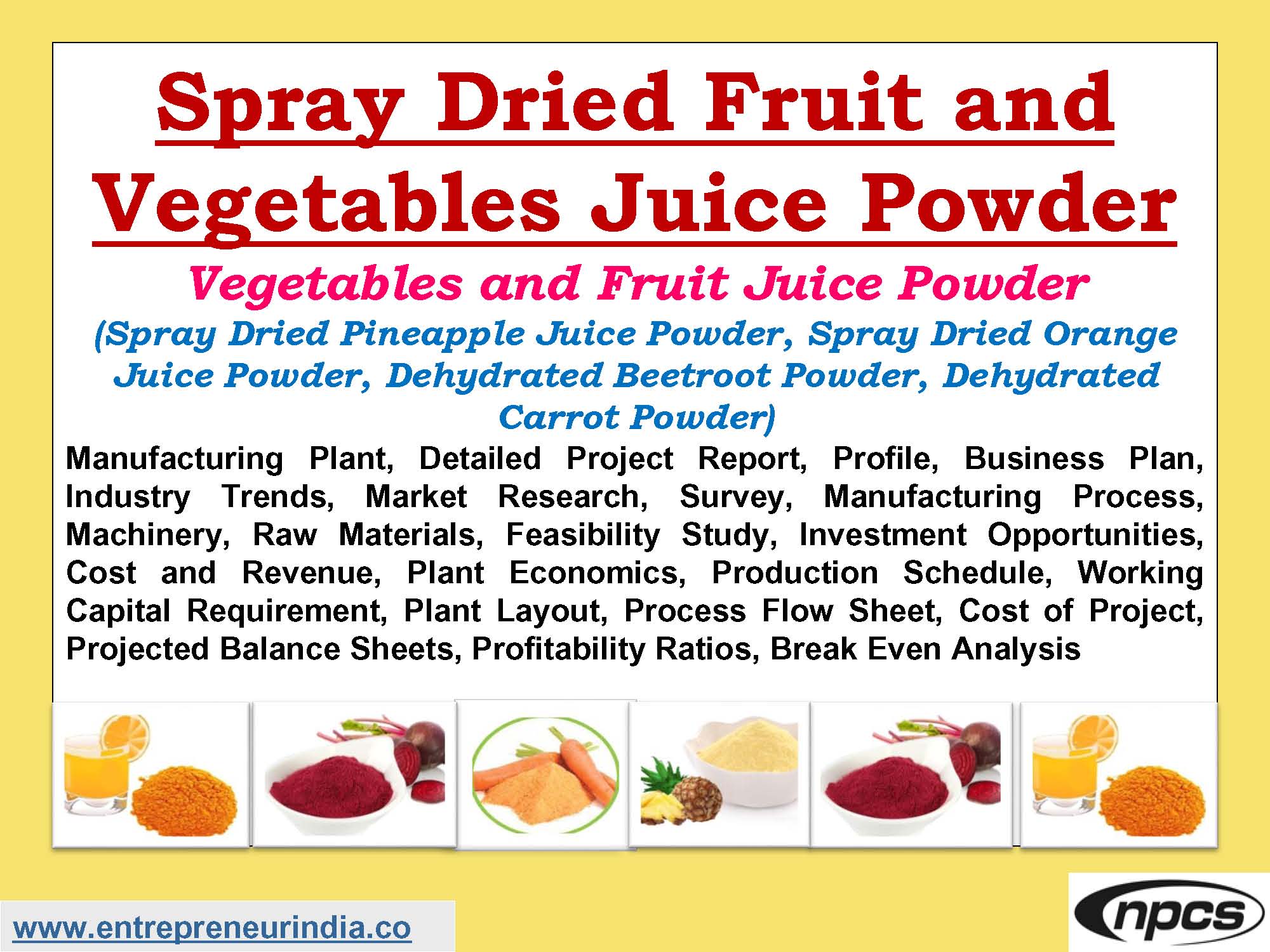
India’s agriculture sector is rich in fruit and vegetable production, but a significant portion goes to waste due to lack of processing and storage infrastructure. To reduce losses and increase shelf life, the demand for Spray-Dried Fruit & Vegetable Powders is rapidly growing in food, beverage, and nutraceutical industries. These powders are used in juices, baby food, seasonings, bakery mixes, instant foods, and health supplements. Moreover, spray drying is an effective and scalable technique to preserve flavor, color, and nutrition. Starting a plant for spray-dried products is a lucrative business idea that combines innovation with rising market needs.
Contents
- 1 Spray-Dried Fruit & Vegetable Powders | Start a Plant
Spray-Dried Fruit & Vegetable Powders | Start a Plant
Setting up a plant to manufacture Spray-Dried Fruit & Vegetable Powders is a profitable opportunity with long-term benefits. From mango and banana to tomato and spinach, nearly any fruit or vegetable can be converted into a shelf-stable powder using this advanced method. With the growing popularity of clean-label and ready-to-use ingredients, spray-dried powders are now preferred by FMCG companies, exporters, and health-conscious consumers. Moreover, the process allows year-round availability of seasonal produce and opens doors to domestic as well as global markets.
Read Also :How to Start a Kids Electronic Toys Factory
What is Spray Drying?
Spray drying is a dehydration technique that converts liquid pulp or juice into fine powder by rapidly drying it with hot gas. The process is widely used in food and pharma industries for heat-sensitive materials.
Key benefits:
-
Retains natural flavor, aroma, and nutrients
-
Ensures long shelf life (6–12 months)
-
Produces easy-to-store and transport products
-
Maintains consistent quality and hygiene
-
Allows bulk production at commercial scale
Moreover, spray drying is energy-efficient and suitable for both fruits and vegetables.
Popular Spray-Dried Powders You Can Make
Some of the most in-demand Spray-Dried Fruit & Vegetable Powders include:
-
Mango powder
-
Banana powder
-
Tomato powder
-
Pineapple powder
-
Lemon powder
-
Spinach powder
-
Beetroot powder
-
Carrot powder
-
Ginger and garlic powders
-
Papaya or guava powders
Moreover, combinations or blends (like mixed vegetable soup base or smoothie premixes) add product variety and value.
Raw Material and Sourcing Strategy
To produce high-quality spray-dried powders, you need fresh, ripe, and blemish-free produce. Partnering with local farmers, APMC markets, or FPOs (Farmer Producer Organizations) ensures steady supply.
Key sourcing tips:
-
Choose high-yielding seasonal produce
-
Procure in bulk directly from farms to reduce cost
-
Store raw materials in cool chambers if not processed immediately
-
Use organic-certified or pesticide-free produce for premium products
Moreover, sourcing locally reduces transportation costs and ensures freshness.
Machinery and Plant Setup
A fully functional Spray-Dried Fruit & Vegetable Powders unit includes the following equipment:
-
Washer and peeler
-
Fruit/vegetable pulper
-
Juice extractor or homogenizer
-
Spray dryer unit
-
Powder collection chamber
-
Rotary sieve or classifier
-
Packaging line (weighing, filling, sealing)
-
Cold storage (optional)
Capacity: A small-scale plant (100–200 kg/day) can be set up with semi-automatic machinery. Medium and large-scale setups can go up to 1–5 tons/day, requiring advanced automation.
Moreover, the entire plant should maintain hygienic design standards as per FSSAI and GMP norms.
Licensing and Compliance
Starting a manufacturing unit in India requires the following registrations:
-
FSSAI license for food safety compliance
-
Udyam Registration (MSME)
-
Pollution control NOC
-
GST registration
-
Factory license (if employing more than 10 workers)
-
BIS certification (optional for exports)
Moreover, ensure batch coding, nutritional labeling, and expiry dates are clearly mentioned on the packaging.
Investment and Profit Analysis
Here’s a rough idea of capital investment and earnings:
| Business Scale | Investment Range | Monthly Profit Potential |
|---|---|---|
| Small Scale | ?12 – ?20 lakhs | ?50,000 – ?1.5 lakhs |
| Medium Scale | ?25 – ?50 lakhs | ?1.5 – ?3 lakhs |
| Large Scale | ?70 lakhs+ | ?4 – ?10 lakhs+ |
Profit margins depend on product mix, quality, and sales channels. Moreover, premium or organic powders fetch higher prices in the health and wellness sector.
Packaging and Branding
Proper packaging ensures longer shelf life and product appeal. Common options include:
-
Aluminum foil pouches (for 50g to 1 kg packs)
-
HDPE or PET containers with moisture lock caps
-
Zip-lock kraft paper pouches (eco-friendly)
-
Sachets for single-serve applications (beverages or soups)
Include:
-
Ingredients
-
Usage suggestions
-
Nutritional value
-
FSSAI license number
-
Batch code and expiry
Moreover, clean-label, preservative-free, or vegan certifications enhance credibility and help capture niche markets.
Target Markets and Distribution
The demand for Spray-Dried Fruit & Vegetable Powders is rising across various sectors:
-
Food processing companies
-
Juice and beverage brands
-
Health food and supplement makers
-
Baby food manufacturers
-
Institutional buyers (hotels, bakeries, caterers)
-
Exporters (USA, Europe, UAE, Southeast Asia)
-
Online platforms (Amazon, Flipkart, BigBasket)
Moreover, direct-to-consumer sales through your brand’s website or niche health stores can yield higher profit margins.
Marketing Strategies
To grow your business, focus on:
-
Building a website with detailed product listings
-
SEO and content marketing (blogs, recipes, product usage)
-
Sampling to B2B clients and retail chains
-
Exhibiting at food expos and agri-fairs
-
Collaborating with nutritionists, chefs, and influencers
-
Offering trial packs or subscription models
Moreover, visual content showcasing the production process and source farms can help build trust.
See Also :Commercial Meat Processing | Opportunities in the Meat Industry
Conclusion
The rising demand for healthy, natural, and easy-to-use food ingredients is creating a strong market for Spray-Dried Fruit & Vegetable Powders. With relatively low investment and strong scalability, this business offers excellent scope in both domestic and international markets. Moreover, by sourcing fresh produce, using efficient spray-drying technology, and focusing on quality packaging and branding, entrepreneurs can build a sustainable and profitable venture in food processing. Now is the perfect time to tap into this opportunity and start a plant that delivers nutrition with convenience.














